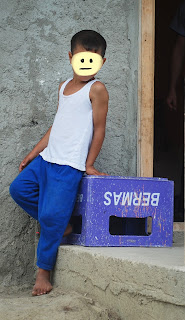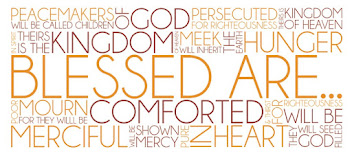En el nombre del Dios: creador, redentor, y santificador. Amen.
I'm cruising on the river of life, happy to trust the flow, enjoying the ride as I live into a new season of life and ministry as the Priest in Charge at Emmanuel Episcopal Church in Webster Groves, MO. I am also co-founder of the Partnership for Renewal, a church vitality nonprofit. You are most welcome to visit my blog anytime and enjoy the ride with me. Peace.
Sunday, November 26, 2023
Christ the King Sunday, 2023: Refined, remade, and restored
En el nombre del Dios: creador, redentor, y santificador. Amen.
Sunday, November 5, 2023
All Saints, 2023-A: Blessed, holy, and worthy of praise
Lectionary: Revelation 7:9-17; Psalm 34:1-10, 22; 1 John 3:1-3; Matthew 5:1-12
(Note: there is no video of this sermon due to being at the diocesan convention through Saturday afternoon. This sermon, as part of our service, can be viewed on Emmanuel Episcopal, Webster Groves' YouTube channel.)
En el nombre del Dios Omnipotente, Cristo el Hijo, y el Espiritu Santo. Amen.
In his book, The Magnificent Defeat, American theologian, Frederick Buechner, said: "…to be a saint is to know joy. Not happiness that comes and goes with the moments that occasion it, but joy that is always there like an underground spring no matter how dark and terrible the night. To be a saint is to be a little out of one's mind, which is a very good thing to be a little out of from time to time. It is to live a life that is always giving itself away and yet is always full." Source.“To be a saint is to be a little out of one’s mind…” he said. Finally, a qualification for sainthood I can meet! I live a little bit out of my mind all of the time. I always have, especially when it comes to my spiritual life. I know many others (even some here) who could say the same but mostly don’t because, well… people will think they’re out of their minds.
The early church considered a saint to be anyone who believed that Jesus is the Christ. The current church still believes that. That’s why the saints we remembered today in our Litany included people of many faiths, civil right advocates, medieval mystics, military generals, and peace activists. They are lay and ordained, women and men: they are all of us.
The gospel reading today reflects for us the character of saints. These aren’t people who rise above their human frailties. On the contrary, Jesus makes very clear that saints are deeply and totally human, and he calls them blessed, that is, holy and worthy of praise.
Jesus says that saints are blessed when they come before God in absolute poverty of spirit, because knowing they need God, they place themselves into God’s care. Saints are blessed when they suffer loss, or desire justice …when they are generous with mercy in the face of sin, … when they work to bring peace out of conflict …when they keep God’s will as their priority, even though they themselves may suffer indignities and injustices for it. Blessed are they, Jesus says. They are holy and worthy of praise.
One saint I loved was an 8-year-old beggar I met when I was part of a mission trip serving the street children in Romania. This little boy was smart, savvy, and doomed by his poverty. Yet his smile, playfulness, and laughter were ever-present. One day, as we walked along the streets of Cluj-Napoca, this precocious little guy begged some money (which, by the way, he could do in about 5 languages), then went and bought a banana. As he returned to where I was sitting on the curb, he broke the banana in two and offered me half. I was overcome by the generosity that came so naturally to him. This precious little one was a saint in heaven by age 10, a victim of his life on the streets. Blessed was he, holy, and worthy of praise. (Pic is a Romanian street child, but not the one I mentioned)The call to purity in these Beatitudes is about our willingness to rely totally on God. This complete reliance, no matter the circumstances of our lives, keeps us in the will of God. It’s a choice: waiting on God’s redeeming love to act rather than asserting our wills (and solutions) into it. This was made real for me by my beloved aunt and godmother, whose bitterness and anger, though justified by the circumstances of her life, made her quite unlovable for many. But as she would tell me the stories of how she made it through terrible ordeals, I saw how she trusted God and waited the very long time it took for redemption to happen. I knew even as a small child, that when I was with her, I was in the presence of purity of heart, and it made her beautiful to me. Blessed was she, holy and worthy of praise.
In his address to our convention, Bp. Rafael Morales of Puerto Rico, exhorted us over and over to go – get out of our churches and into the world and share the good news of the amazing, transforming love we know in Jesus.
Thankfully, Jesus taught us how to do that by embodying the Beatitudes, showing us – in real life – what it looks like to do good to those who hate us, pray for those who abuse us, withhold nothing from anyone, and turn the other cheek. These aren’t metaphors for Jesus – or for us. They are a way of being in the world.So, let’s choose to bring down the boundaries we’ve built up in our minds and in our faith - the ones that keep us safe and sane but separated from one another. Let’s be a little out of our minds and be led by God, taking our place in that eternal procession of saints who were, saints who are, and saints who are yet to come.
Then we too will be blessed, holy, and worthy of praise. Amen.






